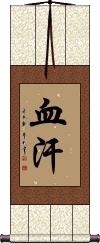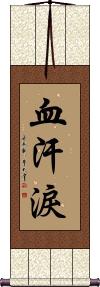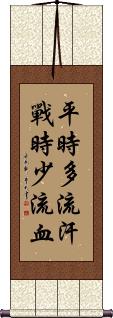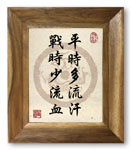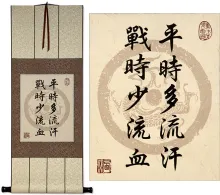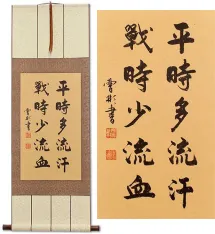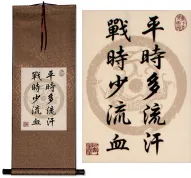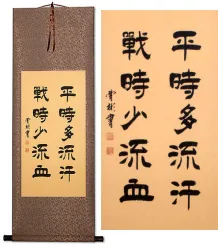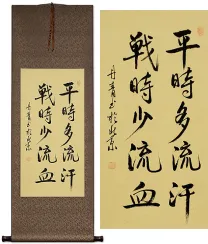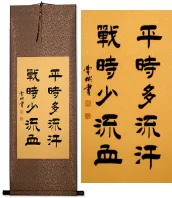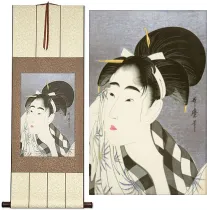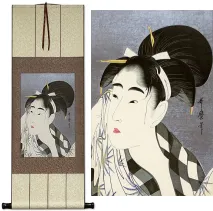Many custom options...
And formats...

Blood Sweat and Tears in Chinese / Japanese...
Buy a Blood Sweat and Tears calligraphy wall scroll here!
Personalize your custom “Blood Sweat and Tears” project by clicking the button next to your favorite “Blood Sweat and Tears” title below...
Blood Sweat and Tears
Blood Sweat and Tears
The More We Sweat in Training, The Less We Bleed in Battle
There is more than one way to translate the ancient Chinese military proverb, 平时多流汗战时少流血. Here are a few interpretations:
A drop of sweat spent in a drill is a drop of blood saved in war.
More practice will give one a better chance of success in real situations.
The more you sweat in training, the less you bleed in battle.
I heard this many times when I was a U.S. Marine but I had no idea at the time that it was actually an old Chinese proverb.
See Also: Blood Sweat and Tears
This in-stock artwork might be what you are looking for, and ships right away...
Gallery Price: $106.00
Your Price: $58.88
Gallery Price: $220.00
Your Price: $112.88
Gallery Price: $72.00
Your Price: $39.88
Gallery Price: $220.00
Your Price: $99.88
Gallery Price: $120.00
Your Price: $61.88
Gallery Price: $220.00
Your Price: $99.88
Gallery Price: $108.00
Your Price: $59.88
Gallery Price: $108.00
Your Price: $59.88
Not the results for Blood Sweat and Tears that you were looking for?
Below are some entries from our dictionary that may match your Blood Sweat and Tears search...
| Characters If shown, 2nd row is Simp. Chinese |
Pronunciation Romanization |
Simple Dictionary Definition |
血汗 see styles |
xuè hàn xue4 han4 hsüeh han kekkan けっかん |
More info & calligraphy: Blood Sweat and Tearsblood, sweat and tears; sweat of blood |
苦練 苦练 see styles |
kǔ liàn ku3 lian4 k`u lien ku lien |
to train hard; to practice diligently; hard work; blood, sweat, and tears |
血の汗 see styles |
chinoase ちのあせ |
(exp,n) blood, sweat and tears; sweat of blood |
嘔心瀝血 呕心沥血 see styles |
ǒu xīn lì xuè ou3 xin1 li4 xue4 ou hsin li hsüeh |
lit. to spit out one's heart and spill blood (idiom); to work one's heart out; blood, sweat and tears |
民脂民膏 see styles |
mín zhī mín gāo min2 zhi1 min2 gao1 min chih min kao |
lit. the fat and wealth of the people (idiom); the nation's hard-won wealth (esp. as an object of unscrupulous exploitation); the people's blood, sweat and tears |
血と汗の結晶 see styles |
chitoasenokesshou / chitoasenokessho ちとあせのけっしょう |
(expression) result of one's blood, sweat, and tears; fruits of one's labour |
The following table may be helpful for those studying Chinese or Japanese...
| Title | Characters | Romaji (Romanized Japanese) | Various forms of Romanized Chinese | |
| Blood Sweat and Tears | 血汗 | kekkan / kekan | xuè hàn / xue4 han4 / xue han / xuehan | hsüeh han / hsüehhan |
| Blood Sweat and Tears | 血汗淚 血汗泪 | xiě hàn lèi xie3 han4 lei4 xie han lei xiehanlei | hsieh han lei hsiehhanlei |
|
| The More We Sweat in Training, The Less We Bleed in Battle | 平時多流汗戰時少流血 平时多流汗战时少流血 | píng shí duō liú hàn zhàn shí shǎo liú xuè ping2 shi2 duo1 liu2 han4 zhan4 shi2 shao3 liu2 xue4 ping shi duo liu han zhan shi shao liu xue | p`ing shih to liu shih shao liu hsüeh ping shih to liu shih shao liu hsüeh |
|
| In some entries above you will see that characters have different versions above and below a line. In these cases, the characters above the line are Traditional Chinese, while the ones below are Simplified Chinese. | ||||
Successful Chinese Character and Japanese Kanji calligraphy searches within the last few hours...
